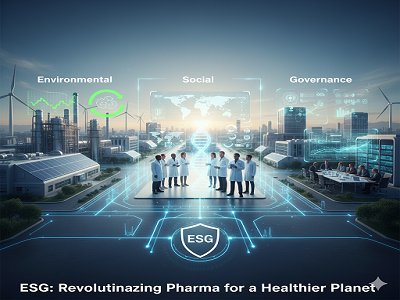How ESG Can Revolutionize the Pharma Industry
PUNE /
Aug. 25, 2025 /
THE INSIGHT PARTNERS

Introduction: The Unseen Potential of ESG in Pharma
Have you ever wondered how the principles of Environmental, Social, and Governance (ESG) can transform the pharmaceutical industry? This article delves into the heart of ESG in Pharma, unlocking its hidden potential.
What is ESG?
It is a framework also used for assessing how well a company compares to others in terms of specific metrics. ESG is a criterion all investors should evaluate, regardless of the industry.
- Environmental: concerns include waste production, pollution, climate change, etc. This concept focuses on how efficiently a company is managing its resources and how they are looking after the environment. Standard policies implemented to promote this include investing in clean, renewable energy and lowering the carbon footprint in the industry.
- Social: involves how well a company treats its clients and workers, and maintaining concerns around diversity, inclusion, human rights, etc. In the social factor, companies usually implement clear policies against child or forced labor. They ensure workers are treated and paid fairly.
- Governance: involves how well a company is in terms of its corporate structure. For example, equal representation of board members is an important Governance factor to evaluate when assessing an organization. Other Governance factors to monitor include account risk management, anti-bribery policies, and the company's ethics. Overall, ESG provides another way to analyze a company without looking at the profit or losses. Instead, it looks at how it impacts the broader society and future generations.
ESG in Pharma
The ESG has influenced the
pharmaceutical industry to change its way of manufacturing and marketing products to the public. Some rising concerns within the industry, including climate change, access to medications, drug pricing, and gouging, are combated with ESG policies and efforts.
These macroeconomic trends influence the future of pharma companies. In order to address climate change, companies like Fisher & Paykel Healthcare and AstraZeneca have dedicated resources. This ensures carbon-negative emissions for the near future.
These companies also provide access to medications in developing countries that can save millions of lives since many countries do not have the infrastructure to provide this, or pharma companies are providing unaffordable prices to the population.
What are Pharma Companies doing in ESG?
ESG provides pharmaceutical companies a competitive advantage economically and socially compared to their peers. When assessing ESG policies, one can also anticipate how successful an organization will be in the future. A perfect example of this within the Nordics region, tenders have favored friendly manufacturing and transportation of medicines.
These tenders promoted a concept of green innovation within the pharmaceutical industry by setting criteria for eco-transport. The humanistic approach to promoting clean manufacturing and transportation of pharmaceutical goods has decreased carbon dioxide by a minimum of 21% within the Nordic regions. This change to further promote ESG guidelines has influenced Norway's Hospital Procurement Trusts (Sykehusinnkjøp) to ensure that environmental certification of supply and production should become a standard for the pharmaceutical industry's future.
Norway's hospital drug procurement systems had also received support from the Public Procurement Appeals Council (KOFA), which determined that even though costs may increase within the medical field, overall, the environmental consequences would be much less. Norway eventually aims to ensure zero emissions during transport soon.
Even major companies such as AbbVie have promoted the ESG criterion by promising to source 100% energy from renewable sources by 2035. Along with this initiative, AbbVie has promoted itself as a zero-waste company by ensuring pay is equitable amongst all genders and ethnicities at its company.
Despite these changes, AbbVie continues to provide affordable pricing for all its medications by introducing co-pay assistance programs. It is impressive to have a pharma giant pave the path and influence other companies to promote ESG criteria.
Amgen recently introduced its green funding plan of a $750 million bond for environmental projects, encouraging clean transportation and renewable energy. Other companies like Teva, Merck, and Pfizer are all establishing green bonds to ensure their company are taking one step toward leaving a positive environmental impact.
Conclusion: A Moral and Strategic Imperative
The pharmaceutical industry possesses the unparalleled ability to alleviate human suffering, extend lifespans, and elevate the quality of life across the globe. However, to fulfill this mandate sustainably, it must reimagine itself through the prism of ESG.
ESG is not a constraintit is a catalyst. A catalyst for environmental renewal, social justice, and principled governance. It offers a blueprint for resilience, relevance, and regeneration. Those who head it call will not only prosper but lead a renaissance in healthcare that is not just innovation.

.png)
.png)



.png)
.png)
.png)